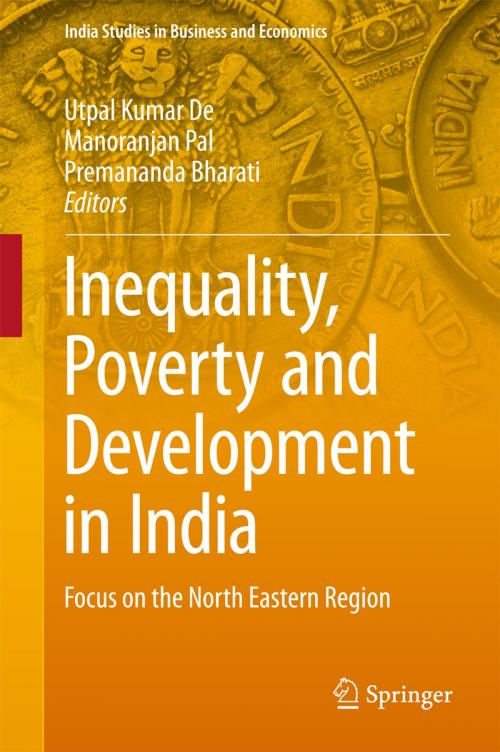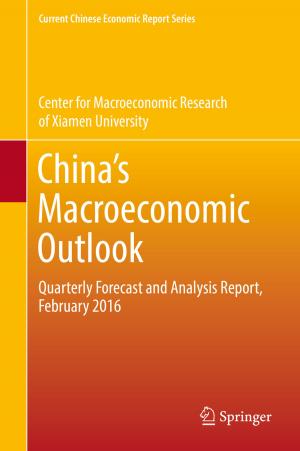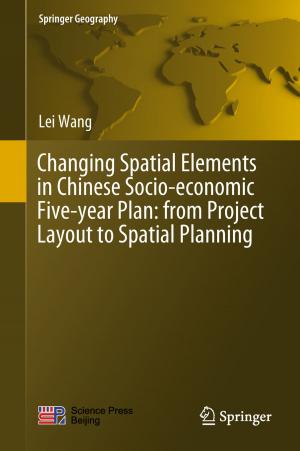Inequality, Poverty and Development in India
Focus on the North Eastern Region
Nonfiction, Social & Cultural Studies, Social Science, Sociology, Reference & Language, Reference, Business & Finance| Author: | ISBN: | 9789811062742 | |
| Publisher: | Springer Singapore | Publication: | November 24, 2017 |
| Imprint: | Springer | Language: | English |
| Author: | |
| ISBN: | 9789811062742 |
| Publisher: | Springer Singapore |
| Publication: | November 24, 2017 |
| Imprint: | Springer |
| Language: | English |
This book reviews the fulfillment of two Millennium Development Goals (MDGs), namely poverty and inequality, in the Indian subcontinent. It examines the complex interplay among development, inequality and poverty in relation to corruption, environmental resource management, agricultural adjustment to climate change and institutional arrangements, with a special focus on the Northeastern region of the country.
The topics covered offer a blend of theoretical arguments and empirical data with regard to the three main themes of the book, while also providing agricultural and environmental perspectives. The book also provides guidelines for policy initiatives for harnessing the region’s potential in the areas of industry, trade, sustainable use of mineral, forest and other natural resources, nature-based tourism through proper infrastructure development, and resolving land issues to achieve inclusive development.
In addition to introducing some new questions on the development-ethnic conflict interface, it uses sophisticated tools such as the Blinder–Oaxaca decomposition method in consumption expenditure to show the endowment, and return to endowment effects; and techniques like spatial correlation-regression to analyze regional variation, co-integration, vector autoregression, the panel data technique and the adaptation index to climate change, to understand socio-economic complexities and the effect of the concerned variables on entrepreneurship and human development.
The book offers a timely contribution to our understanding of major MDGs and highlights their successes and failures. It also includes analytical frameworks that are key to future policy initiatives. Further, it disseminates approaches and methods that improve livelihoods and standards of living through poverty reduction and promoting inclusive development along with sustainable utilization of available natural resources. Putting forward various ideas for creating a more sustainable future, it inspires and encourages readers to pursue further studies to address the gaps that still remain.
This book reviews the fulfillment of two Millennium Development Goals (MDGs), namely poverty and inequality, in the Indian subcontinent. It examines the complex interplay among development, inequality and poverty in relation to corruption, environmental resource management, agricultural adjustment to climate change and institutional arrangements, with a special focus on the Northeastern region of the country.
The topics covered offer a blend of theoretical arguments and empirical data with regard to the three main themes of the book, while also providing agricultural and environmental perspectives. The book also provides guidelines for policy initiatives for harnessing the region’s potential in the areas of industry, trade, sustainable use of mineral, forest and other natural resources, nature-based tourism through proper infrastructure development, and resolving land issues to achieve inclusive development.
In addition to introducing some new questions on the development-ethnic conflict interface, it uses sophisticated tools such as the Blinder–Oaxaca decomposition method in consumption expenditure to show the endowment, and return to endowment effects; and techniques like spatial correlation-regression to analyze regional variation, co-integration, vector autoregression, the panel data technique and the adaptation index to climate change, to understand socio-economic complexities and the effect of the concerned variables on entrepreneurship and human development.
The book offers a timely contribution to our understanding of major MDGs and highlights their successes and failures. It also includes analytical frameworks that are key to future policy initiatives. Further, it disseminates approaches and methods that improve livelihoods and standards of living through poverty reduction and promoting inclusive development along with sustainable utilization of available natural resources. Putting forward various ideas for creating a more sustainable future, it inspires and encourages readers to pursue further studies to address the gaps that still remain.















